When your refrigerator begins to smell unpleasant, the real trouble begins. Here’s how you can eliminate persistent odors and restore freshness to your fridge.
To ensure your refrigerator stays odor-free, we’ll guide you through effective techniques and remedies.
Keep your food fresh and inviting by eliminating unpleasant odors after a power outage.

How to Get Smell Out of Refrigerator After Power Outage
In case of a power outage, here’s how to clean your refrigerator.
Step 1: Take all food out of the refrigerator
Remove all the food items from your refrigerator when dealing with a post-power outage smell.
This will allow you to thoroughly clean the interior and address the source of the odor effectively.
Step 2: Discard spoiled or expired food

Inspect each item carefully and dispose of any spoiled or expired food. These can be major contributors to the unpleasant smell in your refrigerator.
Don’t take chances with questionable items – it’s better to be safe than sorry.
Step 3: Unplug the refrigerator and let it defrost
To tackle the lingering odor, unplug your refrigerator and let it defrost. As the ice melts, excess moisture evaporates, preventing bacterial growth and further odor development.
Step 4: Wash the interior with baking soda and water
Create a solution by mixing two tablespoons of baking soda with a quart of warm water.
Use a clean cloth or sponge to scrub the interior surfaces of your refrigerator with this mixture. Pay special attention to shelves, drawers, and door seals.
Step 5: Wipe down with vinegar solution
Next, prepare a solution of equal parts white vinegar and water. Once you’ve cleaned your refrigerator with baking soda, wipe it down with this mixture. Vinegar helps neutralize odors effectively.
Step 6: Refrigerate odor-absorbing materials
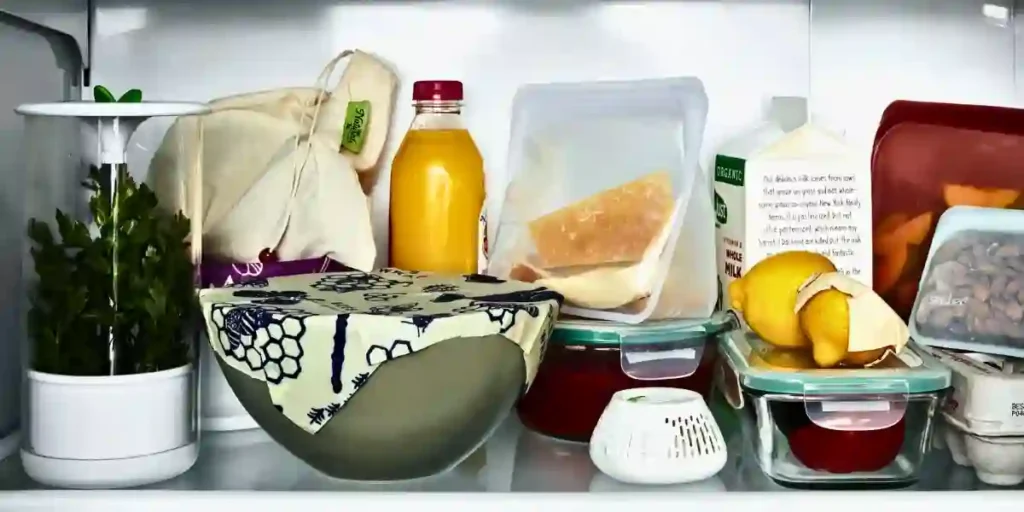
For odor removal, place odor-absorbing materials inside your refrigerator after cleaning.
You can absorb odors with activated charcoal, coffee grounds, or baking soda.
Step 7: Keep the refrigerator well-ventilated
Proper ventilation is essential to prevent odors from building up in your refrigerator.
Make sure the vents are not blocked and there is sufficient airflow around the appliance. This will help maintain a fresh and odor-free environment.
Step 8: Monitor and repeat if necessary
Monitor your refrigerator for any recurring smells. If the odor persists, repeat the cleaning process or seek professional help.
Natural Remedies for Removing Odor from a Refrigerator
Natural Remedies for Removing Odor from a Refrigerator
Activated Charcoal
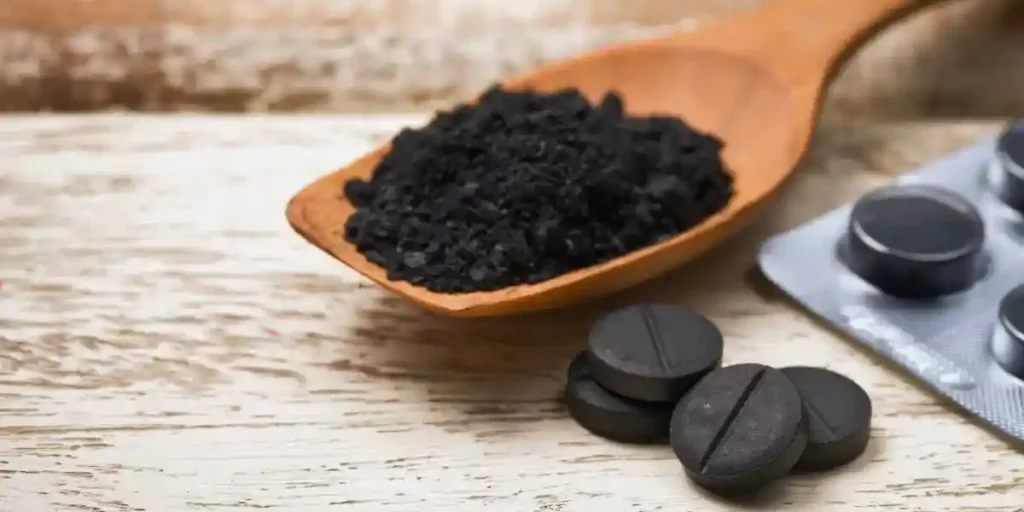
Place a bowl filled with activated charcoal inside your refrigerator. The porous nature of activated charcoal helps absorb and neutralize odors effectively.
Leave the bowl in the refrigerator for a couple of days to allow it to work its magic.
Coffee Grounds
Coffee grounds are another excellent natural remedy for eliminating refrigerator odors.
Fill a bowl with freshly ground coffee and place it inside the refrigerator. It will absorb unpleasant smells and leave behind a subtle coffee aroma.
Vanilla Extract
Dip a cotton ball in vanilla extract and place it on a small dish in the refrigerator. Vanilla has a pleasant scent that can help mask and neutralize odors.
Replace the cotton ball every few days to maintain its effectiveness.
Lemon or Orange Peel
Citrus fruits like lemons and oranges are known for their refreshing scent. Take a few peels and place them inside the refrigerator.
As the peels absorb any lingering odors, they release a pleasant citrus fragrance.
Baking Soda
Baking soda is a versatile and readily available ingredient that works wonders in absorbing odors.
Sprinkle some baking soda on a shallow plate or bowl and place it in the refrigerator. Replace the used baking soda with fresh baking soda after a few days.
White Vinegar
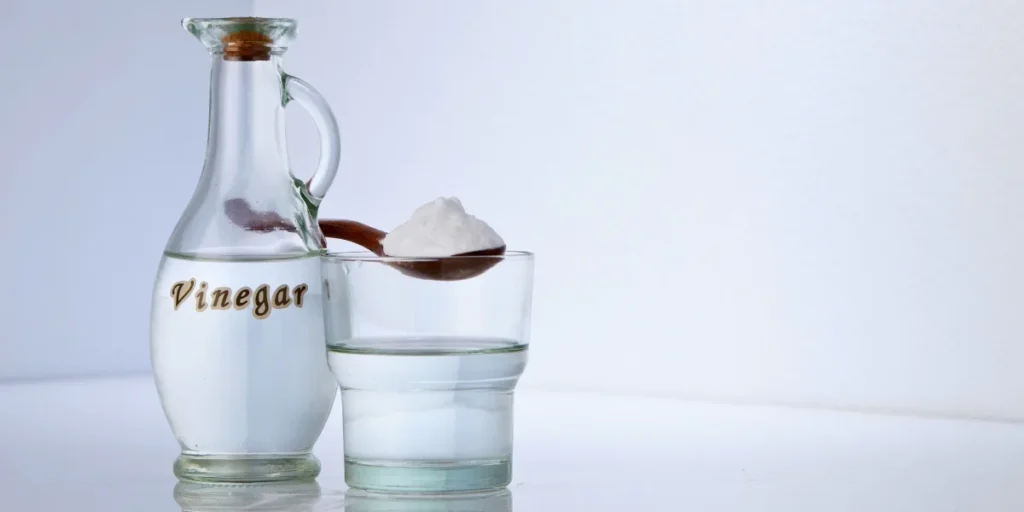
Mix equal parts of water and white vinegar for a powerful natural cleaner and deodorizer.
Spritz the solution inside the refrigerator and wipe it down with a clean cloth. The vinegar will neutralize the odors and leave a fresh, clean scent.
Fresh Air
Sometimes, all your refrigerator needs is a breath of fresh air. Open the doors and windows in your kitchen to allow proper ventilation.
Your refrigerator will smell fresher and feel cleaner if fresh air circulates.
Regular Cleaning
Prevention is key to maintaining an odor-free refrigerator. Make it a habit to regularly clean and organize your refrigerator.
Avoid odors by removing expired or spoiled food promptly and wiping up spills immediately.
Deep Cleaning Your Refrigerator to Banish Lingering Smells
Step 1: Empty the Refrigerator
Remove all food items from your refrigerator first. During cleaning, place perishable items in a cooler with ice packs to keep them fresh.
Step 2: Unplug the Refrigerator
For safety reasons, unplug the refrigerator to avoid any electrical mishaps during the cleaning process.
Step 3: Remove Shelves, Drawers, and Door Bins
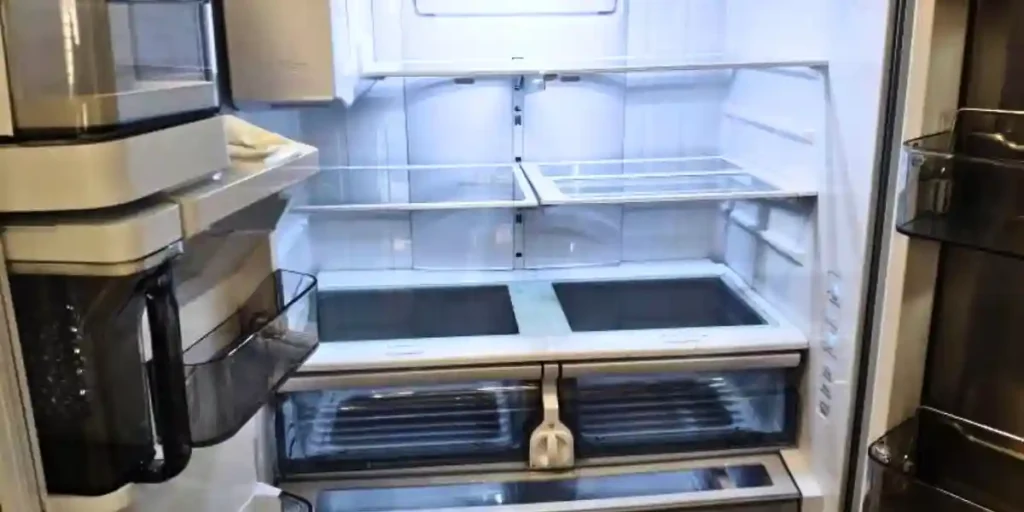
Take out all the removable components of the refrigerator, such as shelves, drawers, and door bins. Place them in a sink filled with warm, soapy water for cleaning.
Step 4: Clean with Warm Soapy Water
Prepare a solution of warm water and mild dish soap. Use a sponge or cloth soaked in this solution to wipe down the interior surfaces of the refrigerator.
Keep food particles and spills away from corners, crevices, and rubber seals.
Step 5: Remove Tough Stains with Baking Soda Paste
For stubborn stains or sticky residues, make a paste by mixing baking soda with a small amount of water.
Scrub gently with a sponge or brush after applying the paste to the affected areas.
Step 6: Rinse and Dry the Components
Thoroughly rinse the shelves, drawers, and door bins that were soaking in the sink. Dry them with a clean towel before placing them back into the refrigerator.
Step 7: Wipe Down the Exterior
Make sure the door handles and control panel of the refrigerator is clean. Use a damp cloth or sponge with the soapy water solution to wipe away dirt and fingerprints. Dry with a clean cloth.
Step 8: Clean the Rubber Seals
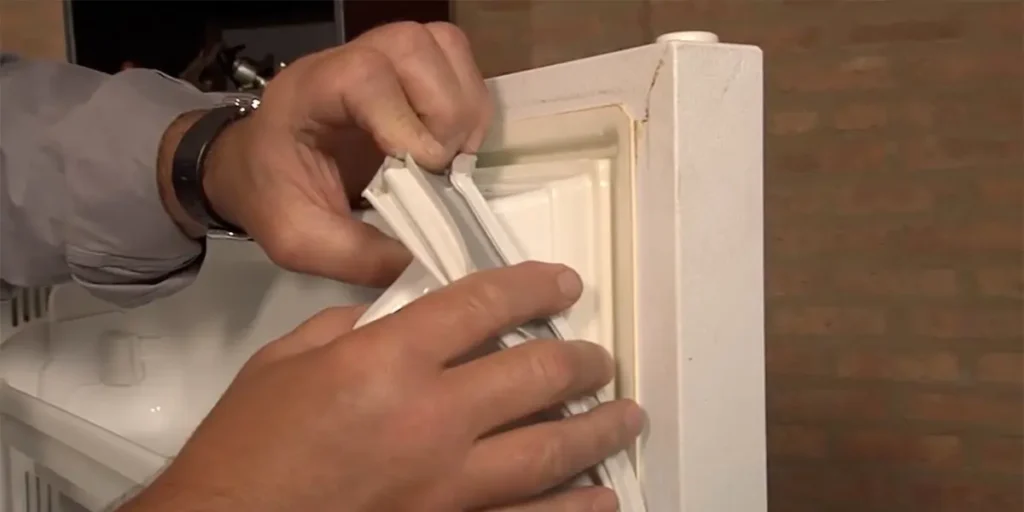
Take a clean cloth or sponge and dip it in a mixture of equal parts white vinegar and water.
Wipe down the rubber seals around the refrigerator door to remove any grime or residue. This will help ensure a proper seal and prevent odor leakage.
Step 9: Air Out the Refrigerator
Leave the refrigerator door open for a while to allow any remaining moisture to evaporate. This step helps prevent mold growth and eliminates any lingering odors.
Step 10: Plug in the Refrigerator and Restock
Plug the refrigerator back in and put the food items back where they belong. Make sure to organize and label items to maintain cleanliness and prevent future odor issues.
Preventive Measures to Avoid Odor Build-Up in Your Refrigerator
There are a few things you can do to prevent odors from building up in your refrigerator.
Proper Food Storage
Ensure that all food items are stored in airtight containers or sealed packaging. This helps prevent strong odors from spreading and keeps your refrigerator smelling fresh.
Label and date your food containers to easily identify any expired items.
Regular Cleaning Routine
Establish a regular cleaning routine for your refrigerator. Immediately wipe down spills and messes to prevent odors from developing.
Every three months, deep clean your refrigerator to remove any hidden residue.
Organize and Rotate Food
Maintain an organized system for storing food in your refrigerator. Arrange items by categories and practice the “first in, first out” method.
Using older items first prevents food from becoming forgotten and eventually developing a foul smell.
Keep Strong-Smelling Foods Separated
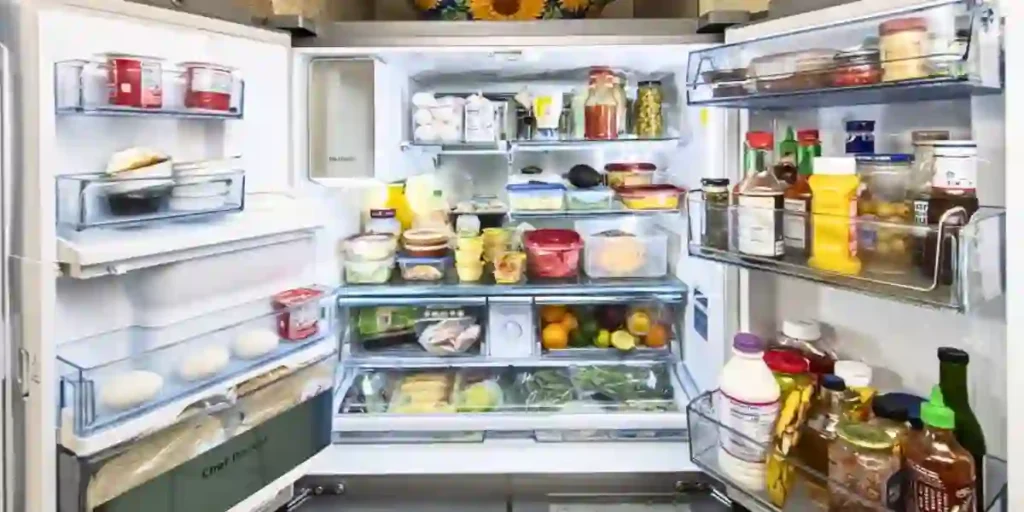
Certain foods, such as onions, garlic, and strong cheeses, can emit potent odors. Refrigerate these items in sealed containers to prevent their scent from permeating other food.
Use Baking Soda or Activated Charcoal
Place an open box of baking soda or a container of activated charcoal in your refrigerator.
These natural odor absorbers will help neutralize any unpleasant smells that may develop over time. Remember to replace them regularly for maximum effectiveness.
Clean the Drip Tray
Locate and clean the drip tray at the bottom of your refrigerator. This tray collects water from condensation and can harbor bacteria or mold, leading to unpleasant odors.
Follow your refrigerator’s manual instructions for safe removal and cleaning.
Check the Door Seals
Regularly inspect the rubber door seals or gaskets for any signs of wear or damage. A damaged seal can allow warm air into the refrigerator, causing condensation and odors.
If needed, replace the seals to ensure a tight seal and optimal temperature control.
Temperature Control
Maintain the proper temperature inside your refrigerator. The recommended temperature range is between 35°F (1.6°C) and 38°F (3.3°C).
This temperature range inhibits bacterial growth and keeps food fresh longer, reducing odors.
FAQs: Addressing Common Concerns about Refrigerator Odor
How Long Does It Take For The Smell To Dissipate After A Power Outage?
In some cases, it may take several weeks for the smell to go away. Within a few days to a week, the smell usually goes away with a thorough cleaning.
Can I Use Bleach To Remove The Smell From My Refrigerator?
Bleach may leave behind a strong chemical odor that may be difficult to remove.
Avoid adding additional unpleasant odors by using natural remedies and cleaning agents.
What Can I Do If The Smell Persists After Cleaning?
If the smell persists even after a thorough cleaning, there are a few additional steps you can take.
In the refrigerator, place a bowl of activated charcoal or coffee grounds. These natural odor absorbers can help absorb the lingering smell.
Conclusion
Take these simple steps to eliminate post-power-outage refrigerator smells. Utilize natural remedies like activated charcoal or coffee grounds to keep your refrigerator fresh.
Regular maintenance can keep your refrigerator odor-free and your food fresh. Enjoy a clean and pleasant-smelling refrigerator today!
